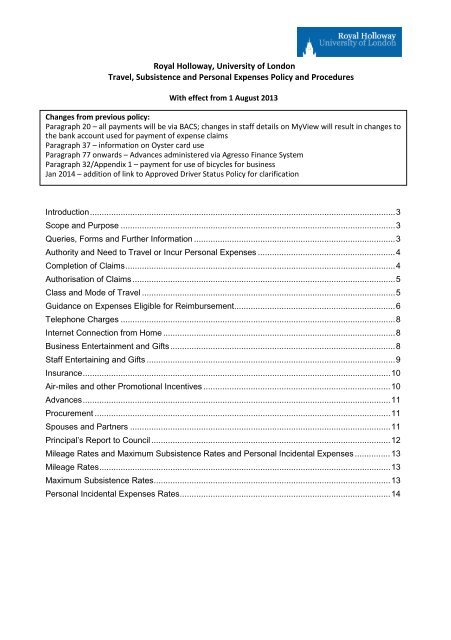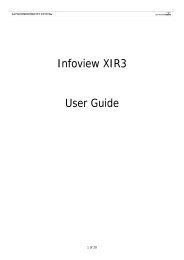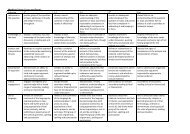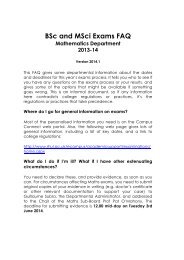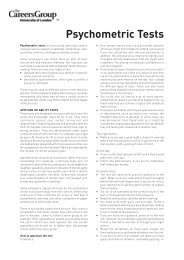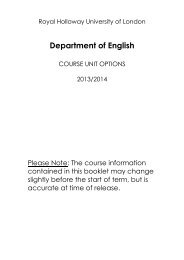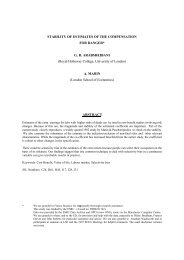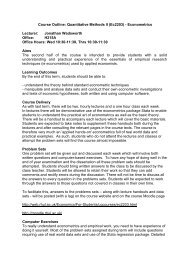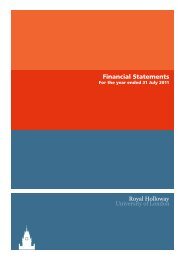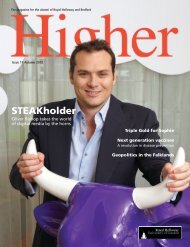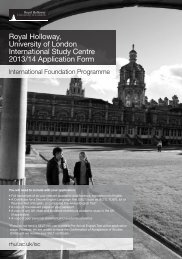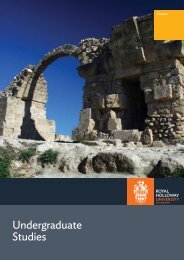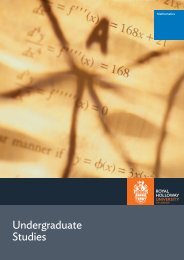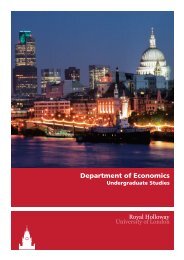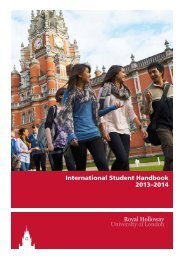Travel and Subsistence Policy - Royal Holloway, University of London
Travel and Subsistence Policy - Royal Holloway, University of London
Travel and Subsistence Policy - Royal Holloway, University of London
You also want an ePaper? Increase the reach of your titles
YUMPU automatically turns print PDFs into web optimized ePapers that Google loves.
<strong>Royal</strong> <strong>Holloway</strong>, <strong>University</strong> <strong>of</strong> <strong>London</strong><br />
<strong>Travel</strong>, <strong>Subsistence</strong> <strong>and</strong> Personal Expenses <strong>Policy</strong> <strong>and</strong> Procedures<br />
With effect from 1 August 2013<br />
Changes from previous policy:<br />
Paragraph 20 – all payments will be via BACS; changes in staff details on MyView will result in changes to<br />
the bank account used for payment <strong>of</strong> expense claims<br />
Paragraph 37 – information on Oyster card use<br />
Paragraph 77 onwards – Advances administered via Agresso Finance System<br />
Paragraph 32/Appendix 1 – payment for use <strong>of</strong> bicycles for business<br />
Jan 2014 – addition <strong>of</strong> link to Approved Driver Status <strong>Policy</strong> for clarification<br />
Introduction ................................................................................................................................. 3<br />
Scope <strong>and</strong> Purpose .................................................................................................................... 3<br />
Queries, Forms <strong>and</strong> Further Information ..................................................................................... 3<br />
Authority <strong>and</strong> Need to <strong>Travel</strong> or Incur Personal Expenses .......................................................... 4<br />
Completion <strong>of</strong> Claims .................................................................................................................. 4<br />
Authorisation <strong>of</strong> Claims ............................................................................................................... 5<br />
Class <strong>and</strong> Mode <strong>of</strong> <strong>Travel</strong> ........................................................................................................... 5<br />
Guidance on Expenses Eligible for Reimbursement .................................................................... 6<br />
Telephone Charges .................................................................................................................... 8<br />
Internet Connection from Home .................................................................................................. 8<br />
Business Entertainment <strong>and</strong> Gifts ............................................................................................... 8<br />
Staff Entertaining <strong>and</strong> Gifts ......................................................................................................... 9<br />
Insurance .................................................................................................................................. 10<br />
Air-miles <strong>and</strong> other Promotional Incentives ............................................................................... 10<br />
Advances .................................................................................................................................. 11<br />
Procurement ............................................................................................................................. 11<br />
Spouses <strong>and</strong> Partners .............................................................................................................. 11<br />
Principal’s Report to Council ..................................................................................................... 12<br />
Mileage Rates <strong>and</strong> Maximum <strong>Subsistence</strong> Rates <strong>and</strong> Personal Incidental Expenses ............... 13<br />
Mileage Rates ........................................................................................................................... 13<br />
Maximum <strong>Subsistence</strong> Rates .................................................................................................... 13<br />
Personal Incidental Expenses Rates ......................................................................................... 14
<strong>Travel</strong>, <strong>Subsistence</strong> <strong>and</strong> Personal Expenses <strong>Policy</strong> <strong>and</strong> Procedures<br />
Quick Find<br />
Accommodation<br />
Advances<br />
Air <strong>Travel</strong> - Purchasing<br />
Air <strong>Travel</strong> - Receipts<br />
Annual Staff Events<br />
Authorisation<br />
Benefit in Kind<br />
Bribery<br />
Business Entertainment<br />
Business Entertainment Authorisation<br />
Business Telephone Calls<br />
Car Parking<br />
Christmas Meals<br />
Class <strong>of</strong> <strong>Travel</strong><br />
Combining Business <strong>and</strong> Non Business <strong>Travel</strong><br />
Computer Equipment<br />
Eligible Expenses<br />
External Awards<br />
External Grant Funding<br />
Eye <strong>and</strong> Eyesight Tests<br />
Freespend Accounts<br />
Gifts Received<br />
Gifts to Staff<br />
Home to Work <strong>Travel</strong><br />
Hospitality Received<br />
Insurance<br />
Insurance – College Vehicles<br />
Insurance - Employee Vehicles<br />
Insurance Excess<br />
Insurance for College Business <strong>Travel</strong><br />
Insurance - Student <strong>Travel</strong><br />
Internet Connection from Home<br />
IPads<br />
Laptops<br />
Mileage Allowance Passengers<br />
Mileage Rates<br />
Non <strong>Travel</strong> Business Expenditure<br />
Oyster Cards<br />
Passports<br />
Per Diem Rates<br />
Personal Gifts to Staff<br />
Personal Incidental Expenses<br />
Personal Incidental Expenses Rates<br />
Private Phone Calls<br />
Private Vehicles<br />
Procurement<br />
Public Transport<br />
Reimbursement<br />
Research Grants<br />
Smart Phones<br />
Spouses <strong>and</strong> Partners<br />
Staff Entertaining<br />
Subscription to Pr<strong>of</strong>essional Bodies<br />
<strong>Subsistence</strong><br />
<strong>Subsistence</strong> Rates<br />
Taxi Fares<br />
Telephone Charges<br />
Telephone Vouchers<br />
Timescale for Claims<br />
<strong>Travel</strong> Abroad<br />
<strong>Travel</strong> Insurance<br />
Vaccinations<br />
Vehicle Hire<br />
Visas<br />
August 2013
<strong>Travel</strong>, <strong>Subsistence</strong> <strong>and</strong> Personal Expenses <strong>Policy</strong> <strong>and</strong> Procedures<br />
Introduction<br />
1 The <strong>Travel</strong>, <strong>Subsistence</strong> <strong>and</strong> Personal Expenses <strong>Policy</strong> <strong>and</strong> Procedures (referred to<br />
hereafter as the <strong>Policy</strong> <strong>and</strong> Procedures) have been approved by the Finance<br />
Committee <strong>of</strong> the College. The contents draw on:<br />
• references to travel included in the College’s Financial Regulations;<br />
• the HEFCE guidance on developing, reviewing <strong>and</strong> applying travel policies;<br />
• HM Revenue <strong>and</strong> Customs (HMRC) guidance on providing expenses <strong>and</strong> benefits for<br />
employees<br />
Scope <strong>and</strong> Purpose<br />
2 The <strong>Policy</strong> <strong>and</strong> Procedures apply to all College employees undertaking travel <strong>and</strong><br />
associated activities <strong>and</strong> incurring personal expenses in the course <strong>of</strong> their<br />
employment by the College. They also apply to persons who are not employees but who are<br />
travelling on the <strong>of</strong>ficial business <strong>of</strong> the College.<br />
3 The <strong>Policy</strong> <strong>and</strong> Procedures apply to all College funds irrespective <strong>of</strong> their nature, including<br />
research grants <strong>and</strong> departmental funds (including ‘freespend’ accounts).<br />
4 Where specific external grant funds are being utilised then the rates <strong>of</strong> reimbursement<br />
specified in the grant’s terms <strong>and</strong> conditions will normally take precedence provided that<br />
these are within limits agreed by the College with HMRC. However they will not override<br />
the requirement for claims to be for actual expenditure <strong>and</strong> supported by receipts.<br />
5 The <strong>Policy</strong> <strong>and</strong> Procedures apply to all expenditure whether paid on invoice, with College<br />
Purchasing cards or reimbursed by an Expense claim.<br />
6 The purposes <strong>of</strong> the <strong>Policy</strong> <strong>and</strong> Procedures are to:<br />
• define the College’s policy <strong>and</strong> procedures relating to business travel <strong>and</strong> related<br />
expenditure;<br />
• provide guidance on the types <strong>of</strong> expenditure that can <strong>and</strong> cannot be reimbursed<br />
by the College; <strong>and</strong><br />
• inform employees <strong>and</strong> those approving expenses <strong>of</strong> their responsibilities.<br />
7 They should be read in conjunction with other relevant policies including Health <strong>and</strong> Safety <strong>and</strong><br />
Fraud, Bribery, Donations <strong>and</strong> Gifts.<br />
Queries, Forms <strong>and</strong> Further Information<br />
8 Queries about the <strong>Policy</strong> <strong>and</strong> Procedures should be addressed to the following:<br />
• Deputy Director <strong>of</strong> Finance or Exchequer Accountant: principles, interpretation <strong>and</strong><br />
HMRC requirements;<br />
• Assistant Director, Procurement: procurement;<br />
August 2013
<strong>Travel</strong>, <strong>Subsistence</strong> <strong>and</strong> Personal Expenses <strong>Policy</strong> <strong>and</strong> Procedures<br />
August 2013<br />
• Payments Office: expense claims <strong>and</strong> reimbursements;<br />
• Insurance Officer: insurance.<br />
9 The forms identified in the <strong>Policy</strong> <strong>and</strong> Procedures, ie the Expenses Claim Form, <strong>and</strong> the<br />
Leave <strong>of</strong> Absence Request Form, together with guidance on completion, are available from<br />
the Finance department web pages on the College intranet. Further information is also<br />
available from these Web pages <strong>and</strong> the Purchasing web pages.<br />
Authority <strong>and</strong> Need to <strong>Travel</strong> or Incur Personal Expenses<br />
10 <strong>Travel</strong> must be for purposes that are clearly <strong>of</strong> a necessary business nature <strong>and</strong> for all travel<br />
arrangements there must be adequate budgetary provision.<br />
11 The approval <strong>of</strong> the budget-holder is required prior to entering into any travel arrangements<br />
or incurring personal expenses. A budget holder may give this approval through the allocation<br />
<strong>of</strong> a budget for a particular purpose or the agreement <strong>of</strong> st<strong>and</strong>ing arrangements for certain<br />
categories <strong>of</strong> activity or type <strong>of</strong> expense. Where appropriate, the approval <strong>of</strong> the grant<br />
sponsor or an appropriate committee must be obtained.<br />
12 For travel abroad staff are required to submit a Leave <strong>of</strong> Absence Request Form for the trip<br />
to be covered by the College personal accident <strong>and</strong> business travel insurance policy. The form<br />
must be approved prior to making committed arrangements to travel. Where staff require<br />
insurance cover for a UK trip <strong>of</strong> substantial cost (>£250) including pre-booked over night<br />
accommodation <strong>and</strong>/or travel tickets a Leave <strong>of</strong> Absence Request Form should be completed.<br />
13 It is not generally the practice for members <strong>of</strong> the College Council who are not staff to travel<br />
on College business, but should such travel be envisaged, the prior approval <strong>of</strong> the Principal in<br />
consultation with the Chairman <strong>of</strong> Council is required. Should the Chairman <strong>of</strong> Council<br />
envisage the undertaking <strong>of</strong> international travel, the prior approval <strong>of</strong> the Council should be<br />
obtained.<br />
Completion <strong>of</strong> Claims<br />
14 Claims for reimbursement <strong>of</strong> expenses should be made on an Expenses Claim Form in<br />
accordance with the guidance given in the Finance department’s web pages.<br />
15 Information on the claim form should make clear the reason for the travel or other<br />
expenditure including, where appropriate, the organisation involved.<br />
16 Employees will only be reimbursed the actual travel <strong>and</strong> associated expenses incurred<br />
solely <strong>and</strong> necessarily in the performance <strong>of</strong> their duties. Expenditure should be kept to the<br />
minimum consistent with the effective performance <strong>of</strong> work on behalf <strong>of</strong> the College.<br />
17 In cases where a claim is being made using rates <strong>and</strong> conditions specified in an<br />
earmarked external award, this should be clearly stated on the claim form <strong>and</strong> the relevant<br />
sections <strong>of</strong> the award’s terms <strong>and</strong> conditions should be attached to the claim <strong>and</strong> highlighted.<br />
Claims must only be for the actual expenditure incurred, supported by receipts: per diem rates<br />
specified in awards cannot be paid through the expenses system unless this is the case.<br />
18 Claims should be supported by original invoices or receipts. Credit card vouchers <strong>and</strong><br />
airline tickets are not, on their own, acceptable substitutes. For air travel, evidence <strong>of</strong><br />
the amount actually paid <strong>and</strong> <strong>of</strong> the journey <strong>and</strong> names <strong>of</strong> the travellers is required. Where
<strong>Travel</strong>, <strong>Subsistence</strong> <strong>and</strong> Personal Expenses <strong>Policy</strong> <strong>and</strong> Procedures<br />
August 2013<br />
original invoices are not available, a written explanation must be given. Photocopied<br />
invoices certified as a true copy may be substituted under some circumstances, for instance if<br />
the original invoice is required by another party. Advice for presenting receipts is available on<br />
the Finance website.<br />
19 Claims for reimbursement should be made on a timely basis <strong>and</strong> not later than eight weeks<br />
after the expenditure has been incurred. However, if an advance payment has been made,<br />
then the claim must be submitted within 15 days <strong>of</strong> completing the journey. When practical to<br />
do so, claims should be made within the financial year in which the expenses have been<br />
incurred. Claims made against a ring-fenced award should be submitted before the end<br />
date <strong>of</strong> the award (or immediately thereafter). If an employee incurs expenses frequently<br />
then it is more cost-effective to claim these at regular intervals (eg monthly) rather than on<br />
each occurrence.<br />
20 Reimbursement will normally be made in £ sterling by direct credit to the UK bank account in<br />
the employee’s name which is currently held on the finance system. Changes to the bank<br />
account for salary payment made by an employee on MyView will result in this bank account<br />
being the account into which expense reimbursements are made.<br />
Authorisation <strong>of</strong> Claims<br />
21 Claims greater than £1,000 in value must be authorised by the Head <strong>of</strong> Department.<br />
Authorisation <strong>of</strong> these claims cannot be delegated. Authorisation <strong>of</strong> claims <strong>of</strong> less than<br />
£1,000 in value can be delegated to a member <strong>of</strong> staff who has managerial authority for<br />
the claimant. In the absence <strong>of</strong> the Head <strong>of</strong> Department, claims greater than £1,000 in value<br />
must be submitted for authorisation by the Dean <strong>of</strong> Faculty, Vice- Principal or Director <strong>of</strong><br />
Resources as applicable.<br />
22 Claims by the Head <strong>of</strong> Department must be submitted for authorisation by the Dean <strong>of</strong><br />
Faculty, Vice-Principal, Principal or Director <strong>of</strong> Operations as applicable.<br />
23 Claims by a Faculty Dean, Vice-Principal <strong>and</strong> Director <strong>of</strong> Operations must be submitted<br />
for authorisation by the Principal (or in his absence the Chairman <strong>of</strong> Council). If the claim<br />
relates to academic departmental activity the Head <strong>of</strong> Department should also approve<br />
the claim for that element.<br />
24 Claims by the Principal must be submitted for authorisation by the Chairman <strong>of</strong> Council.<br />
25 The person authorising the claim should ensure that the claim complies with the <strong>Policy</strong><br />
<strong>and</strong> Procedures, including that it is reasonable, accurate <strong>and</strong> adequately supported by receipts<br />
<strong>and</strong> other evidence. The person authorising the claim should be clearly identified by printing<br />
his or her name on the Expenses claim form.<br />
Class <strong>and</strong> Mode <strong>of</strong> <strong>Travel</strong><br />
26 Journeys by air should be at economy rates. It should be noted that economy class travel<br />
combined with an additional night’s hotel accommodation on arrival is likely to be cheaper<br />
than business class travel undertaken immediately prior to the start <strong>of</strong> the business activity.<br />
27 Journeys made by rail should be at the st<strong>and</strong>ard class.<br />
28 The mode <strong>of</strong> travel (eg air, rail, private car) <strong>and</strong> route used should be selected to achieve<br />
a reasonable balance between the cost <strong>of</strong> the travel <strong>and</strong> the time spent travelling. If the
<strong>Travel</strong>, <strong>Subsistence</strong> <strong>and</strong> Personal Expenses <strong>Policy</strong> <strong>and</strong> Procedures<br />
employee decides to use his or her private vehicle even though the budget-holder would have<br />
expected a cheaper alternative mode <strong>of</strong> transport to be used (eg train or other public<br />
transport), then the amount claimed will be limited to the st<strong>and</strong>ard fare or cost <strong>of</strong> the<br />
journey by the alternative mode.<br />
29 When developing contracts <strong>and</strong> other arrangements involving externally funded travel, staff<br />
should consider the impact on their time <strong>of</strong> the travel <strong>and</strong> the possibility <strong>of</strong> securing funding<br />
for travel arrangements that facilitate a speedier turnaround.<br />
30 Exceptions to the policy on class <strong>of</strong> travel may only be authorised by the Principal in<br />
conjunction with the relevant Head <strong>of</strong> Department or Senior Officer, on exceptional grounds,<br />
such as a medical condition or a very strong business case, or because the cost will be met<br />
from earmarked external funding which explicitly provides for travel at a higher class. A copy<br />
<strong>of</strong> this approval must be attached to the Expenses claim.<br />
Guidance on Expenses Eligible for Reimbursement<br />
31 <strong>Travel</strong> between home <strong>and</strong> an employee’s normal place <strong>of</strong> work is not classed as<br />
business travel <strong>and</strong> is not reimbursable.<br />
32 Staff using their private vehicles (car, van, motorcycle or bicycle) for business travel may claim<br />
reimbursement at the mileage rates laid down in Appendix A. The cost <strong>of</strong> fuel for private<br />
vehicles cannot be claimed. The mileage reimbursable for a journey <strong>of</strong> business travel is the<br />
actual mileage travelled provided that the journey is not substantially the same as the journey<br />
between home <strong>and</strong> the normal or permanent place <strong>of</strong> work. Claimants should comply with the<br />
College’s <strong>Policy</strong> on using your own vehicle.<br />
33 Vehicle hire arrangements should be made with one <strong>of</strong> the College’s recommended<br />
suppliers. The vehicle hired must be a st<strong>and</strong>ard, non-luxury model <strong>and</strong> specification. The cost<br />
<strong>of</strong> fuel for hired vehicles may be claimed <strong>and</strong> should be supported by receipts.<br />
34 For journeys by private or hired vehicle, staff are expected to travel together if it is<br />
practical to do so. An additional private mileage allowance is payable for passengers (see<br />
Appendix A).<br />
35 The College will reimburse expenses for car parking costs incurred whilst travelling on<br />
College business away from the employee’s normal place <strong>of</strong> work. Where possible,<br />
claims should be supported by receipts. The College will not reimburse excess parking<br />
charges, fines, wheel clamp unlocking, etc.<br />
36 Taxi fares may be reimbursed for travel within a metropolitan area <strong>and</strong>/or where<br />
suitable local public transport is not available, <strong>and</strong> are normally expected to be for short<br />
distances only. Where possible a receipt should be provided.<br />
37 Local bus, tram <strong>and</strong> underground train fares for business journeys may be claimed. Claims<br />
should be supported by receipts (e.g. used tickets) where possible. Journeys paid by Oyster<br />
card (or similar) will only be reimbursed upon an itemised receipt <strong>of</strong> the journey, with the<br />
exception <strong>of</strong> Zone 1 only journeys paid by Oyster which will be reimbursed for specified<br />
journeys <strong>and</strong> dates. Top ups for Oyster cards cannot be claimed.<br />
38 When employees are away from their normal place <strong>of</strong> work on College business for a period <strong>of</strong><br />
more than 5 hours they may claim subsistence to cover the cost <strong>of</strong> food <strong>and</strong> refreshments <strong>and</strong>,<br />
August 2013
<strong>Travel</strong>, <strong>Subsistence</strong> <strong>and</strong> Personal Expenses <strong>Policy</strong> <strong>and</strong> Procedures<br />
August 2013<br />
if away overnight, accommodation, within the rules <strong>and</strong> limits in Appendix A. Basic st<strong>and</strong>ards<br />
expected <strong>of</strong> hotel <strong>and</strong> other accommodation include cleanliness, privacy, personal security <strong>and</strong><br />
the availability <strong>of</strong> breakfast.<br />
39 Employees making a business trip may spend money on items such as private phone calls <strong>and</strong><br />
laundry. These are not ‘travel expenses’ but are personal incidental expenses incurred whilst<br />
travelling. The College will only reimburse those Personal Incidental Expenses that are<br />
necessary for the business trip <strong>and</strong> in excess <strong>of</strong> those that would have been incurred at home.<br />
Claims should be supported by receipts where possible. The costs <strong>of</strong> personal entertaining<br />
<strong>and</strong> leisure pursuits will not be reimbursed. The limits for Personal Incidental Expenses are<br />
set out in Appendix A.<br />
40 Employees making a business trip may be required to incur minor incidental non- travel<br />
business expenditure such as telephone calls, batteries for <strong>of</strong>ficial equipment, etc. These may<br />
be claimed in the normal way.<br />
41 Employees must not incur personal expenditure on items (except <strong>of</strong> a very low value <strong>and</strong><br />
purchased incidentally), including (but not limited to) personal computing equipment, which<br />
can be procured through the normal College purchasing arrangements. The College may<br />
refuse to reimburse such items <strong>and</strong> may be required to deduct tax <strong>and</strong> national insurance if a<br />
reimbursement is made.<br />
42 If computing equipment, including laptops, iPads, smartphones <strong>and</strong> other equipment, is<br />
purchased by an individual for whatever reason, <strong>and</strong> reimbursed on an expense claim or<br />
College Purchasing card issued to them personally, then the cost will be included on a P11D<br />
<strong>and</strong> treated as a benefit in kind. The related National Insurance will be charged to the<br />
department <strong>and</strong> the cost <strong>of</strong> the equipment will become a taxable benefit for the individual to<br />
be included on their self assessment tax return.<br />
43 Employees are responsible for ensuring that they have valid passports for overseas<br />
business travel. For any journey, the expiry date <strong>of</strong> the passport must be at least 6 months<br />
after the date <strong>of</strong> returning to the United Kingdom. The College does not reimburse the cost <strong>of</strong><br />
passports or the cost <strong>of</strong> replacing lost or stolen passports.<br />
44 Employees may use the College’s appointed travel agent to seek advice on the need for visas<br />
<strong>and</strong> vaccinations for overseas business travel. The cost <strong>of</strong> these may be claimed if it is not<br />
settled by an invoice to the College.<br />
45 The College does not ordinarily reimburse the cost <strong>of</strong> a personal subscription to a<br />
pr<strong>of</strong>essional body, however personal expenditure incurred for this purpose is normally<br />
deductible for tax purposes. Exceptionally, personal subscriptions may be reimbursed in the<br />
following circumstances:<br />
• the subscription is required for a specific business purpose or activity, such as attendance<br />
at a conference or publication in a journal, or obtaining information <strong>and</strong> participating in<br />
relevant discussion boards or HE sector groups; <strong>and</strong><br />
• such a subscription cannot reasonably be purchased by the College directly.<br />
46 The cost <strong>of</strong> eye <strong>and</strong> eyesight tests may be reimbursed to the limit specified by the College<br />
Health <strong>and</strong> Safety Team if the employee is required to use Display Screen Equipment (DSE)<br />
such as computers or other audio-visual equipment in the course <strong>of</strong> employment at the<br />
College. If an optician certifies that a new or altered prescription for glasses is required solely
<strong>Travel</strong>, <strong>Subsistence</strong> <strong>and</strong> Personal Expenses <strong>Policy</strong> <strong>and</strong> Procedures<br />
for DSE usage, the College will pay an allowance <strong>of</strong> up to £60 towards the costs <strong>of</strong> frames,<br />
lenses <strong>and</strong> any special prisms ins<strong>of</strong>ar as the cost relates only to the requirements for DSE<br />
usage.<br />
Telephone Charges<br />
47 Please also refer to the previous section for telephone expenses incurred during business<br />
travel.<br />
48 Employee as Subscriber:<br />
i<br />
ii<br />
No portion <strong>of</strong> the rental <strong>of</strong> a l<strong>and</strong>line, mobile telephone or smartphone or the<br />
telephone itself will be reimbursed;<br />
Business calls will only be reimbursed if supported by an itemised list <strong>of</strong> calls showing<br />
the business calls claimed <strong>and</strong> their cost.<br />
49 College as Subscriber:<br />
i<br />
ii<br />
No arrangement may be entered into that results in the College being the<br />
subscriber for a telephone at the home <strong>of</strong> an employee, unless the prior written<br />
approval <strong>of</strong> the Director <strong>of</strong> Human Resources has been given;<br />
Any incidental personal use <strong>of</strong> such a telephone or smartphone, should be kept to a<br />
minimum. The College reserves the right to recover the cost <strong>of</strong> excessive personal use<br />
from the employee.<br />
50 If the tariff provides for free time this should be allocated to business use on a pro rata<br />
basis.<br />
51 The cost <strong>of</strong> a telephone voucher, including mobile network pay as you go cards, will not be<br />
reimbursed unless the prior written agreement <strong>of</strong> the Assistant Director <strong>of</strong> Finance has been<br />
obtained. The reimbursement is a taxable payment <strong>and</strong> will be monitored by the payroll<br />
team. The request for payment should be submitted on a separate expense claim form<br />
from other expense claims.<br />
Internet Connection from Home<br />
52 The cost <strong>of</strong> a private Internet connection <strong>and</strong> its ongoing fees are not reimbursable.<br />
53 No arrangement may be entered into resulting in the College being the subscriber <strong>of</strong> an<br />
Internet connection at the home <strong>of</strong> an employee, unless the prior written approval <strong>of</strong> the<br />
Director <strong>of</strong> Human Resources has been given. The associated tax <strong>and</strong> national insurance cost<br />
will be recharged to the relevant department.<br />
Business Entertainment <strong>and</strong> Gifts<br />
54 Appropriate entertainment by a member <strong>of</strong> College staff <strong>of</strong> people from an external<br />
organisation for a clear <strong>and</strong> necessary business purpose may be claimed. The expenditure<br />
incurred should be reasonable <strong>and</strong> not excessive. There should be a clearly justifiable purpose<br />
for each employee’s attendance <strong>and</strong> there should not be so many employees attending as to<br />
suggest it is largely a staff social event. A claim for business entertainment should state the<br />
purpose <strong>of</strong> the entertainment, the number <strong>of</strong> people attending from each organisation <strong>and</strong><br />
August 2013
<strong>Travel</strong>, <strong>Subsistence</strong> <strong>and</strong> Personal Expenses <strong>Policy</strong> <strong>and</strong> Procedures<br />
August 2013<br />
the organisation’s name, <strong>and</strong> give for each member <strong>of</strong> College staff their name <strong>and</strong> role in<br />
the context <strong>of</strong> the business relationship with the external organisation(s). The most senior<br />
College person present should settle the bill <strong>and</strong> make the claim for reimbursement.<br />
55 Excessive hospitality or other entertainment <strong>of</strong>fered by an external organisation should be<br />
refused. As a guide one might only accept hospitality that one could reciprocate in a similar<br />
fashion. The acceptance <strong>of</strong> corporate hospitality where one is part <strong>of</strong> a group being<br />
entertained would normally be reasonable.<br />
56 Gifts that appear to have a value <strong>of</strong> greater than £50 should be refused or returned.<br />
57 If it is possible to accept the gift but raffle it for charity the donor could then be thanked<br />
<strong>and</strong> informed that £x had been raised for ‘y’ charity. In cases where it may be appropriate<br />
for the College to accept the gift, then it may be accepted on that underst<strong>and</strong>ing.<br />
58 If it is judged that following these guidelines might cause <strong>of</strong>fence to the donor, then the<br />
Principal should be notified <strong>and</strong> a judgement will be made, <strong>and</strong> a record kept <strong>of</strong> this.<br />
59 Personal gifts arising from the staff student relationship should be refused if their timing<br />
could in any way be construed as influencing academic judgement.<br />
60 Every department should keep a Hospitality/Gift book in which all members <strong>of</strong> staff should<br />
enter any hospitality or gifts received, except for items such as diaries <strong>and</strong> calendars.<br />
61 In all cases common sense should prevail: would you feel comfortable if whatever you had<br />
accepted were blazoned over all the newspapers<br />
62 Reference should be made to the College’s Gift <strong>and</strong> Hospitality <strong>Policy</strong>, Anti-Bribery <strong>Policy</strong> <strong>and</strong><br />
other Polices which are held on the College website; these take precedence over the <strong>Travel</strong>,<br />
<strong>Subsistence</strong> <strong>and</strong> Personal Expenses <strong>Policy</strong>.<br />
Staff Entertaining <strong>and</strong> Gifts<br />
63 Departments are authorised to spend up to a maximum <strong>of</strong> £60 (including VAT) per person<br />
during the year at annual events, such as a Christmas meal or to mark the start or end <strong>of</strong> an<br />
academic year, to a maximum <strong>of</strong> £30 per head per event. The event must be open to <strong>and</strong><br />
appropriate for all staff in the Department in order to avoid a tax liability <strong>and</strong> comply with the<br />
College’s Equal Opportunities <strong>Policy</strong>. The claim for reimbursement must be made for the<br />
department as a whole stating it is claimed under this provision, <strong>and</strong> not by each member <strong>of</strong><br />
staff. The claim must be supported by a receipt <strong>and</strong> the number <strong>and</strong> names <strong>of</strong> staff attending<br />
the event must be stated on the claim form. If the cost is charged to a purchasing card, the<br />
same information must also be provided.<br />
64 Staff entertainment not open to all the department may be permitted on an exceptions basis<br />
with the prior agreement <strong>of</strong> the Head <strong>of</strong> Department, for example a restaurant meal to mark<br />
the end <strong>of</strong> a dem<strong>and</strong>ing project or a retirement. Such costs will attract a tax <strong>and</strong> national<br />
insurance charge which will be payable by the department. The names <strong>of</strong> all members <strong>of</strong> staff<br />
attending such events must be submitted with the claim on the appropriate form.<br />
65 Personal gifts to staff are not normally a reimbursable expense. However, in certain cases it<br />
may be appropriate for the department to make a gift, such as flowers, for example in the<br />
event <strong>of</strong> serious illness or on a retirement (but not for routine events such as birthdays). The<br />
gift from the department must cost no more than £50 <strong>and</strong> cannot be in the form <strong>of</strong> cash or
<strong>Travel</strong>, <strong>Subsistence</strong> <strong>and</strong> Personal Expenses <strong>Policy</strong> <strong>and</strong> Procedures<br />
Insurance<br />
vouchers. Gifts cannot be made as recognition <strong>of</strong> a work-related achievement. The Head <strong>of</strong><br />
Department must authorize such expenditure in advance.<br />
66 Insurance cover is normally available to staff at no extra cost for travel on College business,<br />
provided the Insurance Officer has been informed in advance. Authorisation <strong>of</strong> the Leave <strong>of</strong><br />
Absence Request Form is sufficient to ensure that the Insurance Officer is informed. If cover is<br />
required at short notice the Insurance Officer should be contacted by telephone, followed up<br />
by written confirmation. A copy <strong>of</strong> the travel insurance cover note is distributed annually to<br />
each academic department.<br />
67 The specified period <strong>of</strong> insurance cover for travel on College business is six months; any<br />
period beyond this will incur an additional premium, which will be charged to the<br />
department, <strong>and</strong> should be arranged through the Insurance Officer. Spouses or Partners<br />
<strong>and</strong> children can be included on the college travel policy at an additional premium, which will<br />
have to be borne by the member <strong>of</strong> staff, <strong>and</strong> should be arranged through the Insurance<br />
Officer.<br />
68 Staff are responsible for following the advice given by the Government about the safety <strong>of</strong><br />
certain areas <strong>of</strong> the world, <strong>and</strong> should consult with the Insurance Officer when planning a trip<br />
to an area <strong>of</strong> high risk as the availability <strong>of</strong> cover may be affected.<br />
69 In the event <strong>of</strong> a claim the department is responsible for the cost <strong>of</strong> the insurance excess<br />
deduction.<br />
70 Claims for reimbursement <strong>of</strong> an insurance premium will not normally be met by the College.<br />
71 College insurance cover does not apply to any non-incidental non-business element <strong>of</strong> a trip,<br />
such as a holiday taken before or after the business activity, <strong>and</strong> staff should arrange their own<br />
insurance for this.<br />
72 <strong>Travel</strong> involving students is not covered automatically by the College’s insurance policy<br />
<strong>and</strong> a separate premium is payable <strong>and</strong> is a charge to the department. The Insurance Officer<br />
must be advised in advance <strong>of</strong> such travel using the required form.<br />
73 The College’s motor policy provides comprehensive cover for an employee with a valid UK<br />
driving licence to drive a hired or College vehicle on College business in the UK <strong>and</strong> parts <strong>of</strong><br />
Europe, but the employee must first have provided the relevant details to the Insurance<br />
Office <strong>and</strong> be cleared to do so. Material changes such as health problems or driving<br />
convictions must be notified to the Insurance Office. The policy is subject to an excess charge<br />
for each claim, which will be borne by the department.<br />
74 The College’s motor vehicle policy does not provide cover for employees driving their own<br />
vehicles on College business. Where an employee uses his or her own vehicle he or she must<br />
ensure that the vehicle insurance policy includes cover for business use. Insurance companies<br />
do not normally charge extra for this. Any extra cost is not reimbursable.<br />
Air-miles <strong>and</strong> other Promotional Incentives<br />
75 The generation <strong>of</strong> air-miles or similar rewards arising from travel on College business should be<br />
noted on the claim form, <strong>and</strong> should be applied to subsequent business travel.<br />
August 2013
<strong>Travel</strong>, <strong>Subsistence</strong> <strong>and</strong> Personal Expenses <strong>Policy</strong> <strong>and</strong> Procedures<br />
Advances<br />
76 Advance payments are costly to administer <strong>and</strong> require additional processing. Personal<br />
payments using credit cards are settled monthly in arrears <strong>and</strong> normally expense claims will be<br />
reimbursed before this. Whenever possible, departmental arrangements should be made for<br />
the direct payment <strong>of</strong> fares, car hire, hotel expenses, etc., thus leaving the minimum<br />
amount to be met in the course <strong>of</strong> the journey. Advance payments are therefore made on a<br />
limited basis.<br />
77 A request to receive an advance should be made via the Agresso finance system at least<br />
twelve working days before payment is required.<br />
78 An advance will be paid BACS transfer. Foreign currency advances are not provided.<br />
79 Within 15 days <strong>of</strong> return, the final expenses claim showing the amount outst<strong>and</strong>ing due<br />
to/from the College should be submitted. It should have attached the appropriate invoices<br />
<strong>and</strong> receipts, <strong>and</strong> the payment due from the employee made payable to the College if there<br />
has been an over advance.<br />
80 Where an advance has not been formally cleared, future expense claims will be set <strong>of</strong>f against<br />
the balance until it is cleared.<br />
Procurement<br />
81 The purchase <strong>of</strong> travel <strong>and</strong> related services are subject to the Financial Regulations, <strong>and</strong> in<br />
particular, the requirement to obtain comparative quotations where appropriate.<br />
82 Information on travel procurement is maintained on the Purchasing web pages including<br />
names <strong>of</strong> preferred travel suppliers, <strong>and</strong> further advice is available from the Procurement<br />
Office.<br />
83 For air travel the following options are available:<br />
August 2013<br />
• Booking on the internet using price comparison websites to identify the best value<br />
• Using one <strong>of</strong> the College’s preferred travel agents, but noting that, for many journeys, a<br />
budget airline ticked booked on the internet will be cheaper<br />
• Using an alternative travel agent, for example where there are specialist requirements,<br />
but obtaining at least one alternative quote to demonstrate that competitive prices have<br />
been obtained.<br />
Combining business <strong>and</strong> non-business travel<br />
84 If business <strong>and</strong> non-business travel are combined in a trip, the expenses claim must show in<br />
sufficient detail the costing <strong>of</strong> the business <strong>and</strong> non-business elements to prove that there is<br />
no subsidy <strong>of</strong> the non-business costs <strong>and</strong> that the primary purpose <strong>of</strong> the trip was business.<br />
Spouses <strong>and</strong> Partners<br />
85 Expenses incurred by or on behalf <strong>of</strong> spouses <strong>and</strong> partners are not reimbursable. An<br />
exception to this can only be made when there is an essential <strong>and</strong> exceptional business<br />
case <strong>and</strong> must be authorised in advance by the Principal on the recommendation <strong>of</strong> the Faculty
<strong>Travel</strong>, <strong>Subsistence</strong> <strong>and</strong> Personal Expenses <strong>Policy</strong> <strong>and</strong> Procedures<br />
Dean, Vice Principal or Director <strong>of</strong> Resources, in conjunction with the Head <strong>of</strong> Department as<br />
appropriate.<br />
Principal’s Report to Council<br />
86 The Principal will report to the Council on any international travel undertaken by any Council<br />
member on College business, other than on overseas visits undertaken in connection with<br />
personal research work or to attend academic conferences <strong>and</strong> funded from research or<br />
other grants. The reports will include the purpose <strong>of</strong> the visit, the outcomes achieved <strong>and</strong><br />
the cost <strong>of</strong> the visit. The costs <strong>of</strong> visits will be taken as Reserved Area Business.<br />
G A Robinson<br />
Director <strong>of</strong> Finance<br />
August 2013<br />
August 2013
<strong>Travel</strong>, <strong>Subsistence</strong> <strong>and</strong> Personal Expenses <strong>Policy</strong> <strong>and</strong> Procedures<br />
Appendix A<br />
Mileage Rates <strong>and</strong> Maximum <strong>Subsistence</strong> Rates <strong>and</strong> Personal Incidental Expenses<br />
Effective for expenses incurred from 1 June 2012<br />
Mileage Rates<br />
1 Employees using their own vehicles on College business may claim a mileage allowance as<br />
follows:<br />
Private Vehicle Cumulative Distance in Tax Year Rate per Mile<br />
Car or van Up to 10,000 business miles 45 pence<br />
Car or van Over 10,000 business miles 25 pence<br />
Motorcycle Any distance 24 pence<br />
Bicycle Any distance 20 pence<br />
2 For each employee who travels on business as a passenger in a private vehicle an<br />
additional 5 pence per mile may be claimed. The name <strong>of</strong> any passenger(s) must be identified<br />
in the claim.<br />
Maximum <strong>Subsistence</strong> Rates<br />
3 When employees are away from their normal place <strong>of</strong> work for a period <strong>of</strong> more than 5<br />
hours <strong>and</strong> incur expenses on food <strong>and</strong> (if away overnight) accommodation, the<br />
appropriate rate <strong>of</strong> subsistence may be claimed.<br />
4 ‘Overnight’ subsistence is for a period (or successive periods) <strong>of</strong> 24 hours <strong>and</strong> is intended to<br />
cover all meals as well as accommodation for that period. If an entire business journey lasts<br />
for more than 5 hours in excess <strong>of</strong> one or more periods <strong>of</strong> 24 hours then those excess hours<br />
attract the appropriate rate <strong>of</strong> daytime subsistence (5 to 10 hours, or over 10 hours).<br />
5 No subsistence is payable for any periods when meals <strong>and</strong>/or accommodation are<br />
included in the fare (for example air travel or rail sleeper).<br />
6 Alcoholic drinks taken with a meal are acceptable as subsistence, but are normally<br />
expected not to exceed one third <strong>of</strong> the total meal cost.<br />
7 All claims for subsistence must be for actual expenditure incurred <strong>and</strong>, wherever possible, must<br />
be supported with receipts. The maximum subsistence rates include taxes (e.g. VAT) <strong>and</strong><br />
gratuities (tips). Gratuities must not be excessive: the claimant may write the amount on the<br />
receipt if it does not already appear there.<br />
8 The subsistence rates given below are the normal maximum amounts that will be paid:<br />
they should not be used as a flat rate without supporting vouchers to show they have been<br />
spent in full.<br />
August 2013
<strong>Travel</strong>, <strong>Subsistence</strong> <strong>and</strong> Personal Expenses <strong>Policy</strong> <strong>and</strong> Procedures<br />
Appendix A<br />
Maximum <strong>Subsistence</strong> Rates<br />
Period<br />
Place<br />
(away from normal workplace or<br />
home on business travel)<br />
Maximum Rate<br />
per Day<br />
Under 5 hours All places Nil<br />
5 to 10 hours<br />
(one meal rate*)<br />
All places £5<br />
Over 10 hours,<br />
but not overnight<br />
(two meal rate*)<br />
All places £10<br />
Overnight, up to 24 hours <strong>London</strong> £125<br />
Overnight, up to 24 hours Elsewhere in UK £105<br />
Overnight, up to 24 hours Overseas See next paragraph<br />
* only three meals can be reimbursed in any 24 hour period.<br />
The overnight allowance for accommodation with Friends/Relatives has been withdrawn by<br />
HMRC. A replacement allowance <strong>of</strong> 10% <strong>of</strong> the overnight accommodation rate (maximum<br />
rate per day as above) may be claimed for a gift for the friend or relative.<br />
9 Hotel accommodation <strong>and</strong> meals overseas should be in hotels <strong>and</strong> restaurants similar in<br />
quality to those that would be used in the UK to keep expenditure within the UK subsistence<br />
rates. As a guide, hotels should be 3-star, or 4-star in more remote, or less secure areas:<br />
exceptions to this must be approved in advance by the Faculty Dean, Director <strong>of</strong> Operations,<br />
Vice-Principal or Principal, as appropriate, in conjunction with the Head <strong>of</strong> Department, <strong>and</strong> a<br />
copy <strong>of</strong> the approval must be attached to the Expenses claim. As the cost <strong>of</strong> such<br />
accommodation <strong>and</strong> the price <strong>of</strong> food in restaurants vary so much worldwide, no maximum<br />
rates <strong>of</strong> subsistence are laid down. Guidance on hotels should be sought from the College’s<br />
appointed travel agents.<br />
Personal Incidental Expenses Rates<br />
10 Personal Incidental Expenses are described in the <strong>Policy</strong> <strong>and</strong> Procedures. The following<br />
maximum rates apply only to overnight stops away from home on College business.<br />
Only actual expenditure can be claimed <strong>and</strong> should be supported by receipts where possible.<br />
If more than the limit is claimed then all <strong>of</strong> the cost becomes a taxable benefit <strong>and</strong> tax <strong>and</strong><br />
national insurance will become payable.<br />
Maximum Personal Incidental Expenses<br />
Place<br />
Maximum Nightly Rate<br />
UK £5<br />
Overseas £10<br />
August 2013


